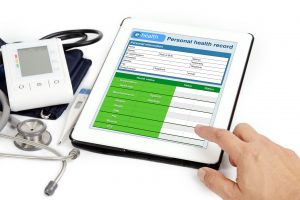When the practice of gathering, storing and using healthcare information is applied in technological settings, it is referred to as health information technology (IT). Healthcare IT is a blanket-expression that refers to the intersection of healthcare and technology. This can involve disciplines such as health informatics, pharmacy informatics, clinical informatics, medical informatics, medical record keeping, health data analytics, population health management and more.
Healthcare IT Professionals Are in Demand
The demand for healthcare IT professionals is still growing rapidly as e-health is implemented into the healthcare system.
Healthcare IT workers are needed to design, develop and support health information systems such as electronic health records (EHRs) and computerized physician order entry (CPOE), which reduces errors by having medical professionals electronically enter medication orders and physician instructions, instead of writing them on paper charts that have to be deciphered or transcribed.
According to Burning Glass Technologies, a Boston-based labor market analytics firm, the demand for healthcare IT workers is projected to grow at twice the rate of employment overall, and there is strong evidence that the nation is facing a shortage of qualified professionals. In Missed Opportunities? The Labor Market in Health Informatics, 2014, Burning Glass reported that health informatics jobs remain open longer than the national average, an indication that employers are having difficulty filling these positions.
According to the U.S. Bureau of Labor Statistics, the demand for IT managers in hospitals will rise by 42% from 2012 to 2022.
Health Informatics Combines Healthcare and IT With a Sense of Contribution
Many of the latest generation healthcare IT jobs are not only technologically challenging but allow experts to feel a tremendous sense of satisfaction, because of their significant impact on healthcare. Some of these specialties include:
- Electronic Health Records (EHRs): The implementation of EHRs allows patient medical records to be more accessible, so information is readily available to any physician. This significantly decreases the time needed for paper records to arrive and reduces the chance of error caused by misinterpreting a physician’s handwriting. These records also allow all of a patient’s healthcare providers to be on the same page – to be aware of what tests have already been run, to know the results of those tests, to know of previous medical conditions and symptoms. EHRs help medical professionals have a more complete picture of a patient’s health, helping to improve medical outcomes.
- Easier Access to Medical Research: New health informatics applications make it easier for physicians to retrieve information on various health conditions and symptoms, making it possible to provide patients with more specialized care.
- More Efficient Clinical Trials: Health informatics helps organize the information gained from clinical trials and makes it easier for physicians to identify patients that would be good candidates for studies.
Learning Opportunities
IT jobs are evolving at a rapid pace, ringing in the era of Health 2.0. Earning an advanced degree in health informatics can open the door to careers that make a difference: improving health and saving lives. Fill out the form on the right to learn about earning your master’s in health informatics from USF Health



